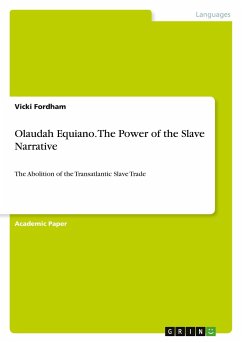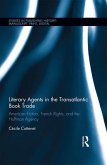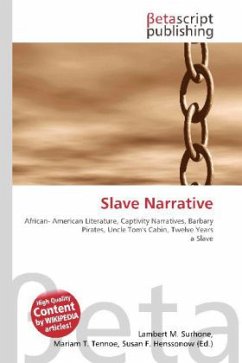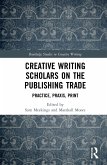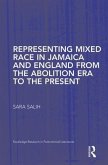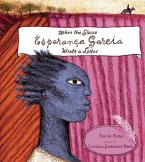Academic Paper from the year 2015 in the subject Literature - Africa, grade: 1, University of Derby, language: English, abstract: It is the aim of this paper to understand why "The Interesting Narrative" had such an impact on the abolition movement and why it is deemed so important in current scholarly studies. Thus, this text argues that "The Interesting Narrative" was effective in creating public support for the abolition of the transatlantic slave trade. This work focuses on how Equiano achieved a successful propaganda narrative; chapter one examines the expression and portrayal of his own personal identity and the identity of the Africans which was crucial in altering the European audience's perception and attitudes towards Africans.The first chapter discusses how Equiano used identity within the narrative to change European perceptions of Africans: representation of animalisation and dehumanisation, along with dual identity are all examined. It further discusses how negativestereotypes of Africans were formed through travel literature and how Equiano wrote the narrative in an autobiographical format. Considerations towards different techniques which encouraged the audience to change their perception towards Africans and motivated them to join the abolition movement and support its cause are examined. The second chapter considers the comparisons which Equiano made between the African and European cultures with regardsto religion, Christianity, biblical references, and the notion of the noble savagery and evolution. There is also a specific focus on how Equiano presented "The Interesting Narrative" to society with the use of book tours and the presentation of the autobiography as a petition to parliament. The book tours targeted all members of society, even those who were illiterate, and petitions promoted "The Narrative"'s sale and increased awareness of slave mistreatment.The third chapter considers how the public in the eighteenth century reacted to "The Interesting Narrative". Newspaper and article reviews both presented and received "The Interesting Narrative" within eighteenth century. This paper argues that Equiano's "Interesting Narrative" encouraged European audiences to change their preconceived perception of Africans; Equiano enabled his audience to understand that Africans were not barbaric savages, but were similar to Europeans and further had the ability to rapidly evolve and become civilised and intelligent, much like the authors of the slave narratives.

